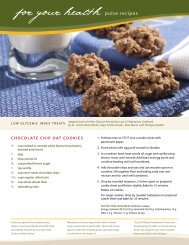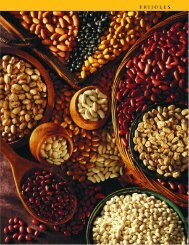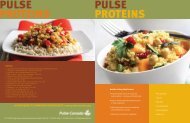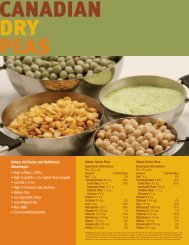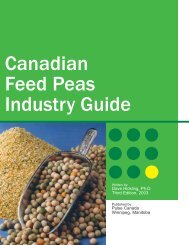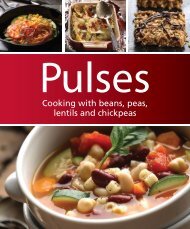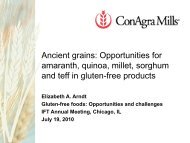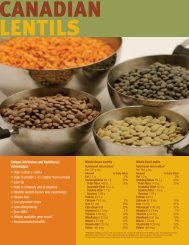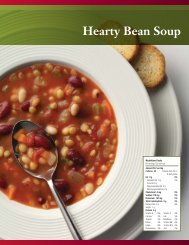Large Scale Recipe Manual - Pulse Canada
Large Scale Recipe Manual - Pulse Canada
Large Scale Recipe Manual - Pulse Canada
Create successful ePaper yourself
Turn your PDF publications into a flip-book with our unique Google optimized e-Paper software.
<strong>Pulse</strong>s and Digestion<br />
Some carbohydrates found in pulses produce gas and bloating<br />
for some people, similar to the effects produced by certain other<br />
foods (e.g. cabbage, broccoli, and other vegetables and fruits).<br />
Eating pulses often allows your gut to adapt to the higher fibre<br />
and carbohydrates, decreasing these effects over time.<br />
A study published in the Nutrition Journal reported that for<br />
participants who ate ½ cup of pinto beans, black beans or<br />
black eyed peas every day for 8 to 12 weeks, less than half<br />
reported increased flatulence during the first week of the<br />
study and by the second or third week, 70% or more of the<br />
participants felt that any increase in flatulence had dissipated.<br />
Interestingly, 3-11% of participants reported increased<br />
flatulence when eating the control foods (canned green beans,<br />
carrots, chicken soup) which did not contain any known<br />
flatulence-producing compound.<br />
Another study published in Food Research International in<br />
2010 found similar results for healthy male participants who<br />
ate soups made from either chickpeas, lentils, or dry peas<br />
versus a potato control every day for a period of 28 days. In this<br />
study, pulse consumption was not associated with significant<br />
changes in participants’ perception of the occurrence or<br />
severity of flatulence. There were also no significant differences<br />
in abdominal discomfort over time or between any of the<br />
treatments.<br />
The primary flatulence-producing compounds in pulses are<br />
the oligosaccharides including raffinose and stachyose which<br />
are carbohydrate compounds that are not readily digested<br />
by humans because of their chemical structure. Soaking and<br />
rinsing dry beans before cooking, as well as rinsing of canned<br />
beans, can reduce the levels of these hard to digest sugars.<br />
It is also important to note that gas production is a normal<br />
physiological process that, to some extent, aids in digestion by<br />
softening and helping to move stools through the colon.<br />
Page 7





